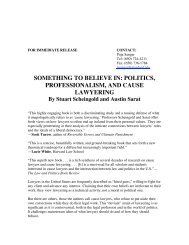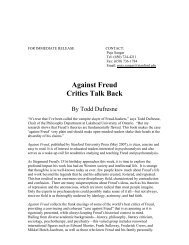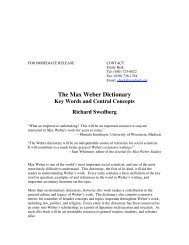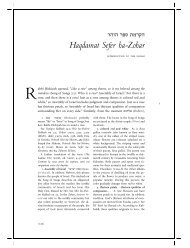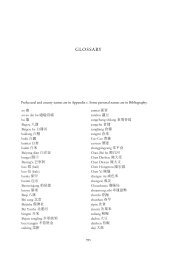Download the PDF - Stanford University Press
Download the PDF - Stanford University Press
Download the PDF - Stanford University Press
You also want an ePaper? Increase the reach of your titles
YUMPU automatically turns print PDFs into web optimized ePapers that Google loves.
Philosophy,<br />
Literature,<br />
& Theory<br />
New and<br />
Forthcoming from<br />
<strong>Stanford</strong> <strong>University</strong> <strong>Press</strong><br />
20% discount<br />
on all titles<br />
2013<br />
<strong>Stanford</strong><br />
<strong>University</strong> <strong>Press</strong>
AVAILABLE IN APRIL 2013<br />
The Highest Poverty<br />
Monastic Rules and<br />
Form-of-Life<br />
Giorgio Agamben<br />
Translated by Adam Kotsko<br />
What is a rule, if it appears to become<br />
confused with life? And what is a human<br />
life, if, in every one of its gestures,<br />
of its words, and of its silences, it<br />
cannot be distinguished from <strong>the</strong> rule?<br />
It is to <strong>the</strong>se questions that Agamben’s<br />
new book turns by means of an impassioned<br />
reading of <strong>the</strong> fascinating and<br />
massive phenomenon of Western monasticism<br />
from Pachomius to St. Francis.<br />
The book reconstructs in detail <strong>the</strong><br />
life of <strong>the</strong> monks with <strong>the</strong>ir obsessive<br />
attention to temporal articulation and<br />
to <strong>the</strong> Rule, to ascetic techniques and<br />
to liturgy. But Agamben’s <strong>the</strong>sis is that<br />
<strong>the</strong> true novelty of monasticism lies<br />
not in <strong>the</strong> confusion between life and<br />
norm, but in <strong>the</strong> discovery of a new<br />
dimension, in which “life” as such,<br />
perhaps for <strong>the</strong> first time, is affirmed<br />
in its autonomy, and in which <strong>the</strong><br />
claim of <strong>the</strong> “highest poverty” and<br />
“use” challenges <strong>the</strong> law in ways that<br />
we must still grapple with today.<br />
Meridian: Crossing Aes<strong>the</strong>tics<br />
144 pp., 2013<br />
9780804784061 Paper $17.95 $14.36 sale<br />
9780804784054 Cloth $50.00 $40.00 sale<br />
The Sparks of<br />
Randomness,<br />
Volume 2<br />
The A<strong>the</strong>ism of Scripture<br />
Henri Atlan<br />
Translated by Lenn J.Schramm<br />
In this second volume Henri Atlan<br />
pursues his investigation of human<br />
life, which he grounds in a distinctive<br />
intermingling of <strong>the</strong> biological and<br />
cognitive sciences and traditions of<br />
Jewish thought. The A<strong>the</strong>ism of Scripture<br />
offers up a paradox: its audacious<br />
<strong>the</strong>sis is that <strong>the</strong> Word or revealed<br />
scripture can be better understood<br />
without God. It must be decrypted or<br />
analyzed a<strong>the</strong>istically, that is, not as<br />
divine revelation, but in and of itself.<br />
“Henri Atlan has undoubtedly become<br />
a great scholar and important international<br />
figure in <strong>the</strong> academic community.<br />
His approach to texts is original and<br />
stimulating, his ideas both lucid and<br />
insightful. He has written many volumes<br />
on a variety of subjects, but this one has<br />
special meaning due to <strong>the</strong> convulsions<br />
society has been undergoing in recent<br />
years. The book is steeped in psychology<br />
and religion, biology and sociology, mysticism<br />
and ethos. Drawing from Talmudic<br />
sources but also from secular ones, it is<br />
sure to find appeal in many circles.”<br />
—Elie Wiesel<br />
Cultural Memory in <strong>the</strong> Present<br />
408 pp., 3 tables, 7 figures, 2013<br />
9780804761352 Paper $29.95 $23.96 sale<br />
9780804761345 Cloth $90.00 $72.00 sale<br />
Most SUP titles are<br />
available as e-books via our<br />
website or your favorite<br />
e-reading platform. Visit<br />
www.sup.org/ebooks<br />
for a complete list of<br />
offerings, as well as e-book<br />
rental and bundle options.<br />
20% discount on all<br />
titles. Use <strong>the</strong> code<br />
S13LIT to redeem this<br />
offer on print books.<br />
Table of Contents<br />
Philosophy.....................................2- 9<br />
Literature and Theory..........10-15<br />
Exam Copy Policy..................................9<br />
Ordering......................................................9<br />
2 Philosophy
Dreaming of<br />
Michelangelo<br />
Jewish Variations on a<br />
Modern Theme<br />
Asher D. Biemann<br />
Dreaming of Michelangelo is <strong>the</strong> first<br />
book-length study to explore <strong>the</strong><br />
intellectual and cultural affinities<br />
between modern Judaism and <strong>the</strong> life<br />
and work of Michelangelo Buonarroti.<br />
It argues that Jewish intellectuals<br />
found <strong>the</strong>mselves in <strong>the</strong> image of<br />
Michelangelo as an “unrequited lover”<br />
whose work expressed loneliness and<br />
a longing for humanity’s response.<br />
The modern Jewish imagination<br />
thus became consciously idolatrous.<br />
Writers brought to life—literally—Michelangelo’s<br />
sculptures, seeing in <strong>the</strong>m<br />
<strong>the</strong>ir own worldly and emotional<br />
struggles. According to Biemann, <strong>the</strong><br />
phenomenon of Jewish self-recognition<br />
in Michelangelo’s work offered an<br />
alternative to <strong>the</strong> failed promises of<br />
<strong>the</strong> German enlightenment. Through<br />
this unexpected discovery, he rethinks<br />
German Jewish history and its connections<br />
to Italy, <strong>the</strong> Mediterranean,<br />
and <strong>the</strong> art of <strong>the</strong> Renaissance.<br />
“A very creative and productive lens for<br />
re-examining <strong>the</strong> entry into modernity<br />
by Western European Jews.”<br />
—Richard Block, <strong>University</strong> of Washington<br />
200 pp., 3 illustrations, 2012<br />
9780804768818 Cloth $50.00 $40.00 sale<br />
Living Thought<br />
The Origins and Actuality<br />
of Italian Philosophy<br />
Roberto Esposito<br />
Translated by Zakiya Hanafi<br />
The work of contemporary Italian<br />
thinkers, what Roberto Esposito<br />
refers to as Italian Theory, is attracting<br />
increasing attention around <strong>the</strong> world.<br />
This book explores <strong>the</strong> reasons for its<br />
growing popularity, its distinguishing<br />
traits, and why people are turning to<br />
<strong>the</strong>se authors for answers to real-world<br />
issues and problems. The approach he<br />
takes, in line with <strong>the</strong> keen historical<br />
consciousness of Italian thinkers<br />
<strong>the</strong>mselves, is a historical one. He<br />
offers insights into <strong>the</strong> great “unphilosophical”<br />
philosophers of life—poets,<br />
painters, politicians and revolutionaries,<br />
film-makers and literary critics—<br />
who have made Italian thought, from<br />
its beginnings, an “impure” thought.<br />
“In this expansive, provocative, and beautifully<br />
written work, Roberto Esposito,<br />
who is one of <strong>the</strong> most original voices<br />
in <strong>the</strong> Continental panorama today, sets<br />
out to articulate <strong>the</strong> ‘Italian difference,’ a<br />
question all <strong>the</strong> more enticing in light<br />
of <strong>the</strong> waning of <strong>the</strong> French generation<br />
that shaped <strong>the</strong> profile of European philosophy<br />
from <strong>the</strong> 1970s onward.”<br />
—Giovanna Borradori, Vassar College<br />
Cultural Memory in <strong>the</strong> Present<br />
296 pp., 6 illustrations, 2012<br />
9780804781565 Paper $23.95 $19.16 sale<br />
9780804781558 Cloth $75.00 $60.00 sale<br />
AVAILABLE IN JUNE 2013<br />
Philosophy and<br />
Melancholy<br />
Benjamin’s Early Reflections<br />
on Theater and Language<br />
Ilit Ferber<br />
This book traces <strong>the</strong> concept of<br />
melancholy in Walter Benjamin’s early<br />
writings. Ra<strong>the</strong>r than focusing on <strong>the</strong><br />
overtly melancholic subject matter<br />
of Benjamin’s work or <strong>the</strong> unhappy<br />
circumstances of his own fate, Ferber<br />
considers <strong>the</strong> concept’s implications<br />
for his philosophy. Informed by Heidegger’s<br />
discussion of moods and <strong>the</strong>ir<br />
importance for philosophical thought,<br />
she contends that a melancholic mood<br />
is <strong>the</strong> organizing principle or structure<br />
of Benjamin’s early metaphysics<br />
and ontology. Her novel analysis of<br />
Benjamin's arguments about <strong>the</strong>ater<br />
and language features a discussion of<br />
<strong>the</strong> Trauerspiel book that is amongst<br />
<strong>the</strong> first in English to scrutinize<br />
<strong>the</strong> baroque plays <strong>the</strong>mselves.<br />
“This is a remarkable study of Walter<br />
Benjamin’s early writings. No longer<br />
an obscure hermetic work from some<br />
distant historical moment, Benjamin’s<br />
Trauerspiel becomes central to contemporary<br />
philosophical concerns.”<br />
—Andrew Benjamin, Monash <strong>University</strong><br />
Cultural Memory in <strong>the</strong> Present<br />
264 pp., 2013<br />
9780804785204 Paper $24.95 $19.96 sale<br />
9780804785198 Cloth $85.00 $68.00 sale<br />
Philosophy<br />
3
<strong>Stanford</strong> BRIEFS<br />
Why Internet<br />
Porn Matters<br />
Margret Grebowicz<br />
Now that pornography is on<br />
<strong>the</strong> Internet, its political and<br />
social functions have changed.<br />
So contends Margret Grebowicz<br />
in this imperative philosophical<br />
analysis of Internet<br />
porn. The production and<br />
consumption of Internet porn,<br />
in her account, are a symptom<br />
of <strong>the</strong> obsession with self-exposure<br />
in today’s social networking<br />
media, which is, in turn, a<br />
symptom of <strong>the</strong> modern democratic<br />
construction of <strong>the</strong> governable<br />
subject as both transparent<br />
and communicative. In<br />
this first feminist critique to<br />
privilege <strong>the</strong> effects of pornography’s<br />
Internet distribution<br />
ra<strong>the</strong>r than what it depicts,<br />
Grebowicz examines pornsharing<br />
communities (such as<br />
<strong>the</strong> bestiality niche market) and<br />
<strong>the</strong> politics of putting women’s<br />
sexual pleasure on display (<strong>the</strong><br />
“squirting” market) as part of<br />
<strong>the</strong> larger democratic project.<br />
<strong>Stanford</strong> Briefs deliver fresh<br />
content in a bite-sized form.<br />
Shorter than <strong>the</strong> average<br />
book, <strong>the</strong>se offerings ei<strong>the</strong>r<br />
provide <strong>the</strong> essence of a<br />
topic, or present incisive<br />
analyses of current affairs<br />
and contemporary issues<br />
that are too long for a<br />
journalistic outlet, but too<br />
short for a book. <strong>Stanford</strong><br />
Briefs promote mindful<br />
action and intelligent<br />
debate, bringing novel<br />
perspectives and <strong>the</strong>oretical<br />
approaches to <strong>the</strong> fore.<br />
Arguing against this project,<br />
she shows that sexual pleasure<br />
is not a human right. Unlikely<br />
convergences between thinkers<br />
like Ca<strong>the</strong>rine MacKinnon,<br />
Jean Baudrillard, Judith Butler,<br />
and Jean-François Lyotard allow<br />
her to formulate a <strong>the</strong>ory of<br />
<strong>the</strong> relationships between sex,<br />
speech, and power that stands<br />
as an alternative to such cyberlibertarian<br />
mottos as “freedom<br />
of speech” and “sexual freedom.”<br />
“A bracing, vital book that should be<br />
required reading for any scholar interested<br />
in <strong>the</strong> politics and <strong>the</strong>ory<br />
of sexuality.”<br />
—Ann Cahill, Elon <strong>University</strong><br />
136 pp., 2013<br />
9780804786621 Paper $12.99 $10.39 sale<br />
9780804785778 ebook $9.99<br />
AVAILABLE IN APRIL 2013<br />
About Europe<br />
Philosophical Hypo<strong>the</strong>ses<br />
Denis Guénoun<br />
Translated by Christine Irizarry<br />
The concept of <strong>the</strong> universal was<br />
born in <strong>the</strong> lands we now call Europe,<br />
yet it is precisely <strong>the</strong> universal that<br />
is Europe’s undoing. All European<br />
politics is caught in a tension: to assert<br />
a European identity is to be open to<br />
multiplicity, but this very openness<br />
could dissolve Europe as such. This<br />
book reflects on Europe and its changing<br />
boundaries over <strong>the</strong> span of twenty<br />
centuries. A work of philosophy, it<br />
consistently draws on concrete events.<br />
From ancient Greece and Rome, to<br />
Christianity, to <strong>the</strong> Reformation, to <strong>the</strong><br />
national revolutions of <strong>the</strong> twentieth<br />
century, what we today call “Europe”<br />
has been a succession of projects in<br />
<strong>the</strong> name of ecclesia or community.<br />
“This remarkable book is a highly insightful<br />
exploration of how European identities<br />
are shaped in our time.”<br />
—Ernesto Laclau, <strong>University</strong> of Essex<br />
Cultural Memory in <strong>the</strong> Present<br />
352 pp., 13 figures, 2013<br />
9780804773867 Paper $29.95 $23.96 sale<br />
9780804773850 Cloth $90.00 $72.00 sale<br />
4 Philosophy
Ronald Dworkin<br />
Third Edition<br />
Stephen Guest<br />
Ronald Dworkin is widely accepted<br />
as <strong>the</strong> most important and most<br />
controversial Anglo-American jurist<br />
of <strong>the</strong> past forty years. And this<br />
same-named volume on his work has<br />
become a minor classic in <strong>the</strong> field,<br />
offering <strong>the</strong> most complete analysis<br />
and integration of Dworkin’s work<br />
to date. This third edition offers a<br />
substantial revision of earlier texts<br />
and, most importantly, incorporates<br />
discussion of Dworkin’s recent<br />
masterwork Justice for Hedgehogs.<br />
Praise for earlier editions:<br />
“Guest sets out to present a comprehensive,<br />
concise and accessible account<br />
of his work, which he has done<br />
with clarity, honesty and even <strong>the</strong><br />
occasional hint of a smile.”<br />
—Paul Roberts, <strong>University</strong> of Nottingham<br />
“The leading work in <strong>the</strong> field . . . I<br />
know of no comparable work of<br />
this scope and depth in <strong>the</strong> study of<br />
Dworkin's work.”<br />
—David A. Richards, New York <strong>University</strong><br />
Jurists: Profiles in Legal Theory<br />
336 pp., 2012<br />
9780804772334 Paper $27.95 $22.36 sale<br />
9780804772327 Cloth $90.00 $72.00 sale<br />
What We Mean by<br />
Experience<br />
Marianne Janack<br />
This book takes on <strong>the</strong> critique of<br />
empiricism and <strong>the</strong> skepticism with<br />
regard to experience that has issued<br />
from two seemingly disparate intellectual<br />
strains of thought: anti-foundationalist<br />
and holistic philosophy<br />
of science and epistemology (Kuhn<br />
and Rorty, in particular) and feminist<br />
critiques of identity politics. Both<br />
strains render experience an intractable<br />
problem by opening up a gap<br />
between a naturalistic understanding<br />
of human beings and an understanding<br />
of humans as cultural entities,<br />
as non-natural makers of meaning.<br />
Marianne Janack aims to close this<br />
gap, to allow us to be naturalistic and<br />
hermeneutic at once. Drawing on<br />
cognitive neuroscience, <strong>the</strong> pragmatist<br />
tradition, and ecological psychology,<br />
her book rescues experience<br />
as natural contact with <strong>the</strong> world.<br />
“In this engaging and highly readable<br />
book, Marianne Janack asks us to think<br />
about experience in a new and original<br />
way. She forges new connections<br />
across diverse philosophical and o<strong>the</strong>r<br />
scholarly positions, each time bringing<br />
<strong>the</strong> reader back to different ways of<br />
considering experience.”<br />
—Lorraine Code, York <strong>University</strong><br />
216 pp., 2 figures, 2012<br />
9780804776158 Paper $21.95 $17.56 sale<br />
9780804776141 Cloth $65.00 $52.00 sale<br />
AVAILABLE IN JUNE 2013<br />
Human Rights as<br />
a Way of Life<br />
On Bergson’s Political<br />
Philosophy<br />
Alexandre Lefebvre<br />
The work of Henri Bergson, <strong>the</strong><br />
foremost French philosopher of<br />
<strong>the</strong> early twentieth century, is not<br />
usually explored for its political<br />
dimensions. Indeed, Bergson is<br />
best known for his writings on time,<br />
evolution, and creativity. This book<br />
concentrates instead on his political<br />
philosophy—and especially on his<br />
late masterpiece, The Two Sources of<br />
Morality and Religion—from which<br />
Alexandre Lefebvre develops an<br />
original approach to human rights.<br />
“Lefebvre’s elaboration of Bergson’s<br />
concept of love is brilliant. His insistence<br />
on Bergson’s use of biology to<br />
understand morality ties into contemporary<br />
debates on neo-vitalism, and<br />
his discussion of De Waal engages<br />
with debates around naturalism and<br />
morality. This important book makes<br />
a real contribution to political <strong>the</strong>ory<br />
and, more locally, to studies in recent<br />
French thought.”<br />
—Leonard Lawlor, Penn State <strong>University</strong><br />
Cultural Memory in <strong>the</strong> Present<br />
208 pp., 2013<br />
9780804785792 Paper $24.95 $19.96 sale<br />
9780804785785 Cloth $80.00 $64.00 sale<br />
Philosophy<br />
5
A Systems Theory<br />
of Religion<br />
Niklas Luhmann<br />
Edited by André Kieserling<br />
Translated by David A. Brenner<br />
with Adrian Hermann<br />
Syn<strong>the</strong>sizing approaches as disparate<br />
as <strong>the</strong> philosophy of language, historical<br />
linguistics, deconstruction, and<br />
formal systems <strong>the</strong>ory/cybernetics,<br />
A Systems Theory of Religion takes<br />
on important topics that range from<br />
religion’s meaning and evolution to<br />
secularization, turning decades of sociological<br />
assumptions on <strong>the</strong>ir head.<br />
It provides us with a fresh vocabulary<br />
and a fresh philosophical and sociological<br />
approach to one of society’s<br />
most fundamental phenomena.<br />
“This posthumously published book<br />
by Niklas Luhmann is arguably one<br />
of <strong>the</strong> most important works in <strong>the</strong><br />
sociology and philosophy of religion of<br />
<strong>the</strong> last hundred years. It can only be<br />
compared in significance and scope to<br />
<strong>the</strong> works of Rudolf Otto, Mary Douglas,<br />
René Girard, Émile Durkheim, Max<br />
Weber, and Claude Lévi-Strauss. It is not<br />
just original, but also generative and<br />
indispensable: future discussions will<br />
have to refer to it, and it will become de<br />
rigueur and uncircumventable.”<br />
—Eduardo Mendieta, Stony Brook <strong>University</strong><br />
Cultural Memory in <strong>the</strong> Present<br />
320 pp., 2013<br />
9780804743297 Paper $24.95 $19.96 sale<br />
9780804743280 Cloth $80.00 $64.00 sale<br />
6 Philosophy<br />
Theory of Society,<br />
Volume 1<br />
Niklas Luhmann<br />
Translated by Rhodes Barrett<br />
This first volume of Luhmann’s twopart<br />
final work was initially published<br />
in German in 1997. The culmination<br />
of his thirty-year <strong>the</strong>oretical project to<br />
reconceptualize sociology, it offers a<br />
comprehensive description of modern<br />
society on a scale not attempted since<br />
Talcott Parsons. Beginning with an<br />
account of <strong>the</strong> fluidity of meaning and<br />
<strong>the</strong> accordingly high improbability of<br />
successful communication, Luhmann<br />
analyzes a range of communicative<br />
media, including language, writing,<br />
<strong>the</strong> printing press, and electronic<br />
media as well as “success media,” such<br />
as money, power, truth, and love, all<br />
of which structure this fluidity and<br />
make communication possible.<br />
“Niklas Luhmann’s membership in<br />
<strong>the</strong> canon of genuinely original and<br />
comprehensive social <strong>the</strong>orists is<br />
radiantly evident. Toge<strong>the</strong>r with that<br />
of Simmel, Durkheim, Weber, Mead,<br />
and Parsons, his work stands as one<br />
of <strong>the</strong> monumental achievements of<br />
twentieth-century sociology. With <strong>the</strong><br />
English publication of Theory of Society,<br />
Luhmann’s magnum opus is finally<br />
available to a global readership.”<br />
—David Wellbery, <strong>University</strong> of Chicago<br />
Cultural Memory in <strong>the</strong> Present<br />
488 pp., 2012<br />
9780804739504 Paper $27.95 $22.36 sale<br />
9780804739498 Cloth $85.00 $68.00 sale<br />
Pragmatism Ascendent<br />
A Yard of Narrative, a<br />
Touch of Prophecy<br />
Joseph Margolis<br />
Pragmatism Ascendent is <strong>the</strong> last of<br />
four volumes on <strong>the</strong> contribution of<br />
pragmatism to American philosophy<br />
and Western philosophy as a whole.<br />
It covers <strong>the</strong> period of American<br />
philosophy’s greatest influence<br />
worldwide, from <strong>the</strong> second half of <strong>the</strong><br />
20th century through <strong>the</strong> beginning of<br />
<strong>the</strong> 21st. The book provides an account<br />
of <strong>the</strong> way pragmatism reinterprets<br />
<strong>the</strong> revolutionary contributions of<br />
Kant and Hegel, <strong>the</strong> significance of<br />
pragmatism’s original vision, and<br />
<strong>the</strong> expansion of classic pragmatism<br />
to incorporate <strong>the</strong> strongest <strong>the</strong>mes<br />
of Hegelian and Darwinian sources.<br />
In <strong>the</strong> process, it addresses many<br />
topics ei<strong>the</strong>r scanted or not addressed<br />
at all in most overviews of<br />
<strong>the</strong> pragmatism’s relevance today.<br />
“Margolis’s pragmatism is one that<br />
stands alongside Rorty, Bernstein, and<br />
Putnam for <strong>the</strong> next generation of pragmatic<br />
naturalists to study and follow.<br />
This book will long be an essential piece<br />
of that body of master work.”<br />
—John Shook,<br />
State <strong>University</strong> of New York at Buffalo<br />
200 pp., 2012<br />
9780804782289 Paper $24.95 $19.96 sale<br />
9780804782272 Cloth $80.00 $64.00 sale
In <strong>the</strong> Self’s Place<br />
The Approach of<br />
Saint Augustine<br />
Jean-Luc Marion<br />
Translated by Jeffrey L. Kosky<br />
An original phenomenological reading<br />
of Augustine that considers his engagement<br />
with notions of identity in Confessions.<br />
Using <strong>the</strong> Augustinian experience<br />
of confessio, Jean-Luc Marion develops<br />
a model of selfhood that examines<br />
this experience in light of <strong>the</strong> whole of<br />
<strong>the</strong> Augustinian corpus. Towards this<br />
end, Marion engages with noteworthy<br />
modern and postmodern analyses of<br />
Augustine’s most “experiential” work,<br />
including <strong>the</strong> critical commentaries of<br />
Jacques Derrida, Martin Heidegger, and<br />
Ludwig Wittgenstein. Marion ultimately<br />
concludes that Augustine has preceded<br />
postmodernity in exploring an excess<br />
of <strong>the</strong> self over and beyond itself, and<br />
in using this alterity of <strong>the</strong> self to itself,<br />
as a driving force for creative relations<br />
with God, <strong>the</strong> world, and o<strong>the</strong>rs.<br />
“In <strong>the</strong> Self’s Place engages with Augustine’s<br />
Confessions, one of <strong>the</strong> incomparable<br />
texts that open <strong>the</strong> intellectual and<br />
religious space we call ‘<strong>the</strong> West.’ Here<br />
Marion continues his critiques of <strong>the</strong> self<br />
and metaphysics, his analysis of praise,<br />
and his bold case for <strong>the</strong> univocity of love.<br />
A major achievement!”<br />
—Kevin Hart, <strong>University</strong> of Virginia<br />
Cultural Memory in <strong>the</strong> Present<br />
448 pp., 2012<br />
9780804762915 Paper $25.95 $20.76 sale<br />
9780804762908 Cloth $90.00 $72.00 sale<br />
ANNOUNCING ITS RE-RELEASE<br />
WITH A NEW PREFACE BY THE<br />
AUTHOR<br />
Being Given<br />
Toward a Phenomenology<br />
of Givenness<br />
Jean-Luc Marion<br />
Translated by Jeffrey L. Kosky<br />
Along with Husserl’s Ideas and<br />
Heidegger’s Being and Time, Being<br />
Given is one of <strong>the</strong> classic works of<br />
phenomenology in <strong>the</strong> twentieth<br />
century. Through readings of Kant,<br />
Husserl, Heidegger, Derrida, and<br />
twentieth-century French phenomenology<br />
(e.g., Merleau-Ponty, Levinas,<br />
and Henry), it ventures a bold and<br />
decisive reappraisal of phenomenology<br />
and its possibilities.<br />
“Simply dazzling: it is a work of tremendous<br />
depth and highly original<br />
thought. . . . It’s amazing how much<br />
Marion . . . has changed <strong>the</strong> landscape<br />
of phenomenology—or what we on<br />
this side of <strong>the</strong> Atlantic call ‘continental<br />
philosophy of religion.’ ”<br />
—The Christian Century<br />
“A major event in contemporary phenomenology,<br />
which will be a major<br />
source of debate and inspiration<br />
for contemporary philosophy and<br />
<strong>the</strong>ology.”<br />
—The Year’s Work in Critical and<br />
Cultural Theory<br />
Cultural Memory in <strong>the</strong> Present<br />
408 pp., 2002<br />
9780804734110 Paper $31.95 $25.56 sale<br />
9780804734103 Cloth $77.00 $61.60 sale<br />
On Philosophy<br />
Notes from a Crisis<br />
John McCumber<br />
Deepening divisions separate today’s<br />
philosophers, first, from <strong>the</strong> culture<br />
at large; <strong>the</strong>n, from each o<strong>the</strong>r; and<br />
finally, from philosophy itself. Though<br />
<strong>the</strong>se divisions tend to coalesce publicly<br />
as debates over <strong>the</strong> Enlightenment,<br />
<strong>the</strong>ir roots lie much deeper. Overcoming<br />
<strong>the</strong>m thus requires a confrontation<br />
with <strong>the</strong> whole of Western philosophy.<br />
The book’s interpretations of figures<br />
past and present are as scrupulous as<br />
its conclusions will be controversial.<br />
The result contributes to <strong>the</strong> most<br />
important question confronting us<br />
today: does reason itself have a future?<br />
“A highly original book that makes a<br />
distinctive and significant contribution<br />
to a number of different philosophical<br />
debates, including <strong>the</strong> nature of reason,<br />
<strong>the</strong> philosophy of history, <strong>the</strong> modernity/postmodernity<br />
debate, and <strong>the</strong><br />
relationship between metaphysics and<br />
oppression.”<br />
—Amy Allen, Dartmouth <strong>University</strong><br />
288 pp., 2013<br />
9780804781435 Paper $25.00 $20.00 sale<br />
9780804781428 Cloth $85.00 $68.00 sale<br />
Philosophy<br />
7
Human, All Too<br />
Human II and<br />
Unpublished<br />
Fragments from <strong>the</strong><br />
Period of Human, All<br />
Too Human II (Spring<br />
1878–Fall 1879)<br />
Volume 4<br />
Friedrich Nietzsche<br />
Translated with an Afterword by<br />
Gary Handwerk<br />
Volume 4 of The Complete Works<br />
of Friedrich Nietzsche contains two<br />
works, Mixed Opinions and Maxims<br />
(1879) and The Wanderer and His<br />
Shadow (1880), originally published<br />
separately, <strong>the</strong>n republished toge<strong>the</strong>r<br />
in <strong>the</strong> 1886 edition of Nietzsche’s<br />
works. Like its predecessor, Human,<br />
All Too Human II is above all an act<br />
of resistance not only to <strong>the</strong> intellectual<br />
influences that Nietzsche felt<br />
called upon to critique, but to <strong>the</strong><br />
basic physical facts of his daily life.<br />
“This series will become <strong>the</strong> definitive<br />
resource for English readers.”<br />
—Gary Shapiro, <strong>University</strong> of Richmond<br />
The Complete Works of Friedrich Nietzsche<br />
648 pp., 2012<br />
9780804783934 Paper $21.95 $17.56 sale<br />
9780804728751 Cloth $65.00 $52.00 sale<br />
8 Philosophy<br />
The Neuro-Image<br />
A Deleuzian Film-<br />
Philosophy of Digital<br />
Screen Culture<br />
Patricia Pisters<br />
Arguing that today’s viewers move<br />
through a character’s brain instead<br />
of looking through his or her eyes or<br />
mental landscape, this book approaches<br />
twenty-first-century globalized<br />
cinema through <strong>the</strong> concept of<br />
<strong>the</strong> “neuro-image.” Pisters explains<br />
why this concept has emerged now,<br />
and she elaborates its threefold<br />
nature through research from three<br />
domains—Deleuzian (schizoanalytic)<br />
philosophy, digital networked screen<br />
culture, and neuroscientific research.<br />
Topics covered along <strong>the</strong> way include<br />
<strong>the</strong> omnipresence of surveillance, <strong>the</strong><br />
blurring of <strong>the</strong> false and <strong>the</strong> real and<br />
<strong>the</strong> affective powers of <strong>the</strong> neo-baroque,<br />
and <strong>the</strong> use of neuro-images in<br />
politics, historical memory, and war.<br />
“This outstanding work makes a major<br />
contribution to film studies and to <strong>the</strong><br />
understanding of <strong>the</strong> work of Gilles<br />
Deleuze. It extends Deleuze’s questions<br />
and concerns by thinking through<br />
recent developments in film and<br />
moving-images culture and succeeds<br />
magnificently in mobilizing his ideas in<br />
order to discover something new.”<br />
—Steven Shaviro, Wayne State <strong>University</strong><br />
Cultural Memory in <strong>the</strong> Present<br />
392 pp., 2012<br />
9780804781367 Paper $27.95 $22.36 sale<br />
9780804781350 Cloth $90.00 $72.00 sale<br />
AVAILABLE IN MARCH 2013<br />
Spectacular Speculation<br />
Thrills, <strong>the</strong> Economy, and<br />
Popular Discourse<br />
Urs Stäheli<br />
Translated by Eric Savoth<br />
A history and sociological analysis of <strong>the</strong><br />
semantics of speculation from 1870 to<br />
1930, when speculation began to assume<br />
enormous importance in popular culture.<br />
Informed by <strong>the</strong> work of Luhmann,<br />
Foucault, Simmel and Deleuze, it looks<br />
at how speculation was translated into<br />
popular knowledge and charts <strong>the</strong> discursive<br />
struggles of making speculation a<br />
legitimate economic practice. Noting that<br />
<strong>the</strong> vocabulary available to discuss <strong>the</strong><br />
concept was not properly economic, <strong>the</strong><br />
book reveals <strong>the</strong> underside of putting it<br />
into words. Speculation’s success depended<br />
upon non-economic language and<br />
morally questionable thrills: a proximity<br />
to <strong>the</strong> wasteful practice of gambling or<br />
o<strong>the</strong>r “degenerate” behaviors, <strong>the</strong> experience<br />
of financial markets as seductive,<br />
or out of control. American discourses<br />
of speculation take center stage, and<br />
<strong>the</strong> book covers an unusual range of<br />
material, including stock exchange<br />
guidebooks, ticker tape, moral treatises,<br />
plays, advertisements, and newspapers.<br />
“A stunningly original and disturbing account<br />
of euphoria and hysteria in world<br />
financial markets.”<br />
—Werner DeBondt, DePaul <strong>University</strong><br />
352 pp., 10 illustrations, 2013<br />
9780804771320 Paper $27.95 $22.36 sale<br />
9780804771313 Cloth $85.00 $68.00 sale
NEW IN PAPERBACK<br />
The Problem<br />
of Distraction<br />
Paul North<br />
We live in an age of distraction. Contemporary<br />
analyses of culture, politics,<br />
techno-science, and psychology insist<br />
on this. They often suggest remedies<br />
for it, or ways to capitalize on it. Yet<br />
<strong>the</strong>y almost never investigate <strong>the</strong><br />
meaning and history of distraction<br />
itself. The Problem of Distraction corrects<br />
this lack of attention. It inquires<br />
into <strong>the</strong> effects of distraction, defined<br />
not as <strong>the</strong> opposite of attention, but as<br />
truly discontinuous intellect. Human<br />
being has to be reconceived, according<br />
to this argument, not as quintessentially<br />
thought-bearing, but as subject to<br />
repeated, causeless blackouts of mind.<br />
“This thoughtful study asks what<br />
would be involved in <strong>the</strong>orizing<br />
<strong>the</strong> interpretive framework through<br />
which an interrogation of distraction<br />
would first become thinkable.”<br />
—Gerhard Richter,<br />
<strong>University</strong> of California, Davis<br />
“This superb analysis of distraction and<br />
our lack of attention to it breaks significant<br />
new ground in our critical history.”<br />
—David Ferris,<br />
<strong>University</strong> of Colorado at Boulder<br />
248 pp., 2011<br />
9780804786874 Paper $22.95 $18.36 sale<br />
9780804775380 Cloth $55.00 $44.00 sale<br />
Examination<br />
Copy Policy<br />
NOW AVAILABLE: e-COPY<br />
To order a digital examination<br />
copy, go to <strong>the</strong> book's page<br />
on www.sup.org and click<br />
“Request Examination Copy.”<br />
This service is free and no<br />
invoice will accompany your<br />
order.<br />
If you wish to receive a hard<br />
copy of a book, please mail<br />
or fax your request on your<br />
department’s letterhead,<br />
specifying <strong>the</strong> title of your<br />
course, your expected enrollment,<br />
<strong>the</strong> semester or<br />
quarter in which <strong>the</strong> course<br />
will be offered, <strong>the</strong> course<br />
level (undergraduate or<br />
graduate), and <strong>the</strong> titles of<br />
any textbooks that you currently<br />
use.<br />
We allow instructors 90<br />
days to consider any title for<br />
potential course adoption.<br />
Your examination copy will<br />
be followed by an invoice,<br />
offering a 20% academic discount<br />
(plus shipping charges)<br />
that is payable within 90<br />
days. If an adoption notification<br />
is received within that 90<br />
day period, your invoice will<br />
be cancelled. O<strong>the</strong>rwise, you<br />
may return <strong>the</strong> copy to our<br />
warehouse, or purchase it for<br />
your own use.<br />
Mail to:<br />
Examination Copy<br />
<strong>Stanford</strong> <strong>University</strong> <strong>Press</strong><br />
1450 Page Mill Road<br />
Palo Alto, CA 94304<br />
Fax to:<br />
(650) 736-1784<br />
Ordering<br />
Receive a 20% discount<br />
on all titles listed in this<br />
catalog. Use <strong>the</strong> following<br />
code to redeem this offer<br />
on hardcover and paperback<br />
editions: S13LIT.<br />
Please order by phone or<br />
online. Call 800-621-2736,<br />
or visit www.sup.org.<br />
Phone orders are accepted<br />
Monday–Friday,<br />
8:00 am to 5:00 pm CT.<br />
Promotional Discount<br />
Code: S13LIT. Orders must<br />
be prepaid or charged on<br />
VISA, MasterCard, Discover<br />
Card, or American Express<br />
(libraries excepted). Books<br />
not yet published or temporarily<br />
out of stock will be<br />
charged to your credit card<br />
when <strong>the</strong> book becomes<br />
available and is in <strong>the</strong> process<br />
of being shipped. <strong>Stanford</strong><br />
<strong>University</strong> <strong>Press</strong> books are<br />
distributed by <strong>the</strong> <strong>University</strong><br />
of Chicago <strong>Press</strong> Distribution<br />
Center. Shipping & Handling<br />
$5.00; outside <strong>the</strong> United<br />
States $8.50; add $1.00/$8.50<br />
for each additional book.<br />
Philosophy<br />
9
Barbarism and Its<br />
Discontents<br />
Maria Boletsi<br />
Barbarism and civilization form one of<br />
<strong>the</strong> oldest and most rigid oppositions<br />
in Western history. According to this<br />
dichotomy, barbarism functions as <strong>the</strong><br />
negative standard through which “civilization”<br />
fosters its self-definition and<br />
superiority by labeling o<strong>the</strong>rs “barbarians.”<br />
Since <strong>the</strong> 1990s, and especially<br />
since 9/11, <strong>the</strong>se terms have become<br />
increasingly popular in Western political<br />
and cultural rhetoric—a rhetoric<br />
that divides <strong>the</strong> world into forces of<br />
good and evil. This study intervenes<br />
in this recent trend and interrogates<br />
contemporary and historical uses of<br />
barbarism, arguing that barbarism also<br />
has a disruptive, insurgent potential.<br />
“Our age is no less barbaric than any<br />
o<strong>the</strong>r time, though more efficient<br />
and more globally repercussive in its<br />
ability to perpetrate acts of barbarism.<br />
Boletsi’s attempt to recoup and recast<br />
<strong>the</strong> notion of barbarism as redemptive<br />
force—discursive and worldly ‘real’––is<br />
a timely and compelling undertaking<br />
that she carries out admirably and conscientiously.”<br />
—Djelal Kadir, Penn State <strong>University</strong><br />
Cultural Memory in <strong>the</strong> Present<br />
328 pp., 9 illustrations, 2013<br />
9780804782760 Cloth $60.00 $48.00 sale<br />
The Game of<br />
Probability<br />
Literature and Calculation<br />
from Pascal to Kleist<br />
Rüdiger Campe<br />
Translated by<br />
Ellwood H. Wiggins, Jr.<br />
The Game of Probability revisits<br />
<strong>the</strong> seventeenth and eighteenthcentury<br />
“probabilistic revolution,”<br />
providing a history of <strong>the</strong> relations<br />
between ma<strong>the</strong>matical and rhetorical<br />
techniques, between <strong>the</strong> scientific<br />
and <strong>the</strong> aes<strong>the</strong>tic. Focusing on <strong>the</strong><br />
interpretation of games of chance as<br />
<strong>the</strong> model for probability and on <strong>the</strong><br />
reinterpretation of aes<strong>the</strong>tic form as<br />
verisimilitude (a critical question for<br />
<strong>the</strong>oreticians of that new literary genre,<br />
<strong>the</strong> novel), <strong>the</strong> scope alone of Campe’s<br />
book argues for probability’s crucial<br />
role in <strong>the</strong> constitution of modernity.<br />
“This marvelous book belongs among<br />
<strong>the</strong> most distinguished publications to<br />
have emerged out of cultural studies in<br />
Germany during <strong>the</strong> past thirty years.”<br />
—David E. Wellbery <strong>University</strong> of Chicago<br />
Cultural Memory in <strong>the</strong> Present<br />
504 pp., 3 tables, 2013<br />
9780804768658 Paper $35.00 $28.00 sale<br />
9780804768641 Cloth $95.00 $76.00 sale<br />
Writing Against Time<br />
Michael W. Clune<br />
For centuries, a central goal of art has<br />
been to make us see <strong>the</strong> world with<br />
new eyes. Thinkers from Edmund<br />
Burke to Elaine Scarry have understood<br />
this effort as <strong>the</strong> attempt to create<br />
new forms. But as anyone who has ever<br />
worn out a song by repeated listening<br />
knows, artistic form is hardly immune<br />
to sensation-killing habit. Some of<br />
our most ambitious writers—Keats,<br />
Proust, Nabokov, Ashbery—have been<br />
obsessed by this problem. Attempting<br />
to create an image that never gets old,<br />
<strong>the</strong>y experiment with virtual, ideal<br />
forms. Poems and novels become<br />
workshops, as fragments of <strong>the</strong> real<br />
world are scrutinized for insights and<br />
<strong>the</strong> shape of an ideal artwork is pieced<br />
toge<strong>the</strong>r. These writers, voracious in<br />
<strong>the</strong>ir appetite for any knowledge that<br />
will fur<strong>the</strong>r <strong>the</strong>ir goal, find help in<br />
unlikely places. The logic of totalitarian<br />
regimes, <strong>the</strong> phenomenology of music,<br />
<strong>the</strong> pathology of addiction, and global<br />
commodity exchange furnish <strong>the</strong>m<br />
with tools and models for arresting<br />
neurobiological time. Reading central<br />
works of <strong>the</strong> past two centuries in light<br />
of <strong>the</strong>ir shared ambition, Clune produces<br />
a revisionary understanding of<br />
some of our most important literature.<br />
200 pp., 2013<br />
9780804770828 Paper $22.95 $18.36 sale<br />
9780804770811 Cloth $75.00 $60.00 sale<br />
10 Literature & Theory
AVAILABLE IN MARCH 2013<br />
Warped Mourning<br />
Stories of <strong>the</strong> Undead in <strong>the</strong><br />
Land of <strong>the</strong> Unburied<br />
Alexander Etkind<br />
After Stalin’s death in 1953, <strong>the</strong> Soviet<br />
Union dismantled <strong>the</strong> enormous system<br />
of terror and torture that he had<br />
created. But <strong>the</strong>re has never been any<br />
Russian ban on former party functionaries,<br />
nor any external authority to<br />
dispense justice. Memorials to <strong>the</strong> Soviet<br />
victims are inadequate, and <strong>the</strong>ir<br />
families have received no significant<br />
compensation. This book’s premise is<br />
that late Soviet and post-Soviet culture,<br />
haunted by its past, has produced a<br />
unique set of memorial practices. More<br />
than twenty years after <strong>the</strong> collapse of<br />
<strong>the</strong> Soviet Union, Russia remains “<strong>the</strong><br />
land of <strong>the</strong> unburied”: <strong>the</strong> events of<br />
<strong>the</strong> mid-twentieth century are still<br />
very much alive, and still contentious.<br />
Alexander Etkind shows how post-<br />
Soviet Russia has turned <strong>the</strong> painful<br />
process of mastering <strong>the</strong> past into an<br />
important part of its political present.<br />
“Etkind’s brilliant and lucid work presents<br />
<strong>the</strong> first serious account of <strong>the</strong>oretical<br />
challenges to mourning <strong>the</strong>ories in <strong>the</strong><br />
context of Soviet terror.”<br />
—Nancy Condee, <strong>University</strong> of Pittsburgh<br />
Cultural Memory in <strong>the</strong> Present<br />
320 pp., 13 illustrations, 2013<br />
9780804773935 Paper $25.95 $20.76 sale<br />
9780804773928 Cloth $85.00 $68.00 sale<br />
Georges Bataille<br />
Phenomenology and<br />
Phantasmatology<br />
Rodolphe Gasché<br />
Translated by Roland Végső<br />
This book investigates what Bataille,<br />
in “The Pineal Eye,” calls mythological<br />
representation: <strong>the</strong> mythological<br />
anthropology with which this unusual<br />
thinker wished to outflank and<br />
undo scientific (and philosophical)<br />
anthropology. Gasché probes that<br />
anthropology by situating Bataille’s<br />
thought with respect to <strong>the</strong> quatrumvirate<br />
of Schelling, Hegel, Nietzsche,<br />
and Freud. He begins by showing<br />
what Bataille’s understanding of<br />
<strong>the</strong> mythological owes to Schelling.<br />
Drawing on Hegel, Nietzsche, and<br />
Freud, he <strong>the</strong>n explores <strong>the</strong> notion<br />
of image that constitutes <strong>the</strong> sort<br />
of representation that Bataille’s<br />
innovative approach entails. Gasché<br />
concludes that Bataille’s mythological<br />
anthropology takes on Hegel’s phenomenology<br />
in a systematic fashion.<br />
“A splendid introduction to a revolutionary<br />
thinker, still not as known in<br />
this country as he ought to be, written<br />
by a renowned commentator on<br />
twentieth-century French thought. An<br />
important book!”<br />
—Arkady Plotnitksy, Purdue <strong>University</strong><br />
Cultural Memory in <strong>the</strong> Present<br />
352 pp., 2012<br />
9780804776073 Paper $25.95 $20.76 sale<br />
9780804776066 Cloth $85.00 $68.00 sale<br />
Better Left Unsaid<br />
Victorian Novels, Hays<br />
Code Films, and <strong>the</strong><br />
Benefits of Censorship<br />
Nora Gilbert<br />
Better Left Unsaid is in <strong>the</strong> unseemly<br />
position of defending censorship<br />
from <strong>the</strong> central allegations that are<br />
traditionally leveled against it. Taking<br />
two genres generally presumed to<br />
have been stymied by <strong>the</strong> censor’s<br />
knife—<strong>the</strong> Victorian novel and<br />
classical Hollywood film—this book<br />
reveals <strong>the</strong> varied ways in which<br />
censorship, for all its blustery selfrighteousness,<br />
can actually be good<br />
for sex, politics, feminism, and art.<br />
“Through her meticulous comparisons<br />
of Victorian novels and Hays Code<br />
Hollywood, Gilbert studies visual and<br />
verbal slippage, inference, irony, and<br />
<strong>the</strong> pleasure of perversion. Informative<br />
and a delight to read, Better Left Unsaid<br />
sparkles with wit and invention.”<br />
—Tom Conley, Harvard <strong>University</strong><br />
The Cultural Lives of Law<br />
200 pp., 13 illustrations, 2012<br />
9780804784207 Cloth $50.00 $40.00 sale<br />
Literature & Theory 11
AVAILABLE IN APRIL 2013<br />
Counterculture<br />
Colophon<br />
Grove <strong>Press</strong>, <strong>the</strong><br />
Evergreen Review, and <strong>the</strong><br />
Incorporation of <strong>the</strong> Avant-<br />
Garde<br />
Loren Glass<br />
Responsible for such landmark<br />
publications as Lady Chatterley’s<br />
Lover, Tropic of Cancer, Naked Lunch,<br />
Waiting for Godot, The Wretched of<br />
<strong>the</strong> Earth, and The Autobiography of<br />
Malcolm X, Grove <strong>Press</strong> was <strong>the</strong> most<br />
innovative publisher of <strong>the</strong> postwar<br />
era. Counterculture Colophon tells <strong>the</strong><br />
story of how <strong>the</strong> press and its house<br />
journal, The Evergreen Review, revolutionized <strong>the</strong> publishing industry and radicalized<br />
<strong>the</strong> reading habits of <strong>the</strong> “paperback generation.” In <strong>the</strong> process, it offers<br />
a new window onto <strong>the</strong> 1960s, from 1951, when Barney Rosset purchased<br />
<strong>the</strong> fledgling press for $3,000, to 1970, when <strong>the</strong> multimedia corporation into<br />
which he had built <strong>the</strong> company was crippled by a strike and feminist takeover.<br />
Grove <strong>Press</strong> was not only responsible for ending censorship of <strong>the</strong> printed<br />
word in <strong>the</strong> United States but also for bringing avant-garde literature, especially<br />
drama, into <strong>the</strong> cultural mainstream as part of <strong>the</strong> quality paperback<br />
revolution. Much of this happened thanks to Rosset, whose charismatic<br />
leadership was crucial to Grove’s success. With chapters covering world<br />
literature and <strong>the</strong> Latin American boom, including Grove’s close association<br />
with UNESCO and <strong>the</strong> rise of cultural diplomacy; experimental drama<br />
such as <strong>the</strong> <strong>the</strong>ater of <strong>the</strong> absurd, <strong>the</strong> Living Theater, and <strong>the</strong> political epics<br />
of Bertolt Brecht; pornography and obscenity, including <strong>the</strong> landmark<br />
publication of <strong>the</strong> complete work of <strong>the</strong> Marquis de Sade; revolutionary<br />
writing, featuring Rosset’s daring pursuit of <strong>the</strong> Bolivian journals of Che<br />
Guevara; and underground film, including <strong>the</strong> innovative development<br />
of <strong>the</strong> pocket filmscript, Loren Glass covers <strong>the</strong> full spectrum of Grove’s<br />
remarkable achievement as a communications center of <strong>the</strong> counterculture.<br />
“Brimming with as many colorful and brilliant personalities as it is with good ideas<br />
and cogent analyses, this book fills in a major gap in our knowledge of postwar<br />
American culture, and will appeal to anyone who has ever felt <strong>the</strong> lure of dangerously<br />
sexy ideas.”<br />
—Mark McGurl, <strong>Stanford</strong> <strong>University</strong><br />
“A riveting and highly entertaining narrative, Glass’s book offers a compelling new<br />
map of <strong>the</strong> world system of postwar literature, a map on which Paris and New<br />
York figure less as competing capitals than as <strong>the</strong> closest of trading partners. It<br />
provides a whole new perspective on <strong>the</strong> American literary scene of <strong>the</strong> 1950s,<br />
60s, and 70s.”<br />
—James F. English, <strong>University</strong> of Pennsylvania<br />
296 pp., 42 illustrations, 2013<br />
9780804784160 Cloth $27.00 $21.60 sale<br />
Atmosphere, Mood,<br />
Stimmung<br />
On a Hidden Potential<br />
of Literature<br />
Hans Ulrich Gumbrecht<br />
Translated by Erik Butler<br />
What are <strong>the</strong> various atmospheres<br />
or moods that <strong>the</strong> reading of literary<br />
works can trigger? Hans Ulrich<br />
Gumbrecht has long argued that <strong>the</strong><br />
function of literature is not so much<br />
to describe, or to re-present, as to<br />
make present. Here, he goes one<br />
step fur<strong>the</strong>r, exploring <strong>the</strong> substance<br />
and reality of language as a material<br />
component of <strong>the</strong> world—impalpable<br />
hints, tones, and airs that, as<br />
much as <strong>the</strong>y may be elusive, are<br />
no less matters of actual fact.<br />
“The perspective on literature that<br />
[Gumbrecht] presents here—<strong>the</strong><br />
study of <strong>the</strong> emotional reactions,<br />
moods, and atmospheres that reading<br />
can trigger—entails a serious methodological<br />
challenge. How can one<br />
avoid delivering subjective impressions<br />
without any objective relevance?<br />
His answer is as simple as it is bold,<br />
thought-provoking, and charming:<br />
You can’t.”<br />
—Eckart Goebel, New York <strong>University</strong><br />
152 pp., 5 illustrations, 2012<br />
9780804781220 Paper $18.95 $15.16 sale<br />
9780804781213 Cloth $65.00 $52.00 sale<br />
12 Literature & Theory
AVAILABLE IN JUNE 2013<br />
After 1945<br />
Latency as Origin of<br />
<strong>the</strong> Present<br />
Hans Ulrich Gumbrecht<br />
What is it <strong>the</strong> legacy that humankind<br />
has been living with since 1945? We<br />
were once convinced that time was<br />
<strong>the</strong> agent of change. But in <strong>the</strong> past<br />
decade or two, our experience of time<br />
has been transformed. Technology<br />
preserves and inundates us with <strong>the</strong><br />
past, and we perceive our future as<br />
a set of converging and threatening<br />
inevitabilities: nuclear annihilation,<br />
global warming, overpopulation.<br />
Overwhelmed by <strong>the</strong>se horizons, we<br />
live in an ever broadening present. In<br />
identifying <strong>the</strong> prevailing mood of<br />
<strong>the</strong> post-World War II decade as that<br />
of “latency,” Gumbrecht returns to<br />
<strong>the</strong> era when this change in <strong>the</strong> pace<br />
and structure of time emerged and<br />
shows how it shaped <strong>the</strong> trajectory<br />
of his own postwar generation.<br />
“Quirky, superbly composed, and<br />
nuanced. . . . A totally original meditation<br />
on how our sense of time has<br />
changed over <strong>the</strong> last two-thirds of a<br />
century.”<br />
—Harold Bloom, Yale <strong>University</strong><br />
240 pp., 2013<br />
9780804785181 Cloth $35.00 $28.00 sale<br />
AVAILABLE IN MAY 2013<br />
Nineteenth-Century<br />
Jewish Literature<br />
A Reader<br />
Edited by Jonathan M. Hess,<br />
Maurice Samuels, and<br />
Nadia Valman<br />
Recent scholarship has brought to light<br />
<strong>the</strong> existence of a dynamic world of<br />
specifically Jewish forms of literature in<br />
<strong>the</strong> nineteenth century—fiction by Jews,<br />
about Jews, and often designed largely for<br />
Jews. This volume makes this material<br />
accessible to English speakers for <strong>the</strong><br />
first time, offering a selection of Jewish<br />
fiction from France, Great Britain, and<br />
<strong>the</strong> German-speaking world. Offering<br />
unique insights into <strong>the</strong> hopes and fears<br />
of Jews experiencing <strong>the</strong> dramatic impact<br />
of modernity, <strong>the</strong> literature collected<br />
in this book will provide compelling<br />
reading for all those interested in modern<br />
Jewish history and culture, whe<strong>the</strong>r<br />
general readers, students, or scholars.<br />
“As a compendium of previously unavailable<br />
material, Nineteenth-Century<br />
Jewish Literature gives us a glimpse<br />
into a forgotten world. By presenting<br />
<strong>the</strong> literature itself, this book opens<br />
ra<strong>the</strong>r than closes <strong>the</strong> question of what<br />
this body of literature means, allowing<br />
readers to see it for <strong>the</strong>mselves<br />
and engage with it in new ways.”<br />
—Lisa Moses Leff, American <strong>University</strong><br />
<strong>Stanford</strong> Studies in Jewish History and Culture<br />
456 pp., 2013<br />
9780804775472 Paper $29.95 $23.96 sale<br />
9780804775465 Cloth $95.00 $76.00 sale<br />
Slow Print<br />
Literary Radicalism and<br />
Late Victorian Print Culture<br />
Elizabeth Carolyn Miller<br />
This book explores <strong>the</strong> literary culture<br />
of Britain’s radical press from 1880 to<br />
1910, a time that saw a flourishing of<br />
radical political activity as well as <strong>the</strong><br />
emergence of a mass print industry.<br />
“Builds carefully on several generations of<br />
scholarship in <strong>the</strong> field—but pushes <strong>the</strong><br />
scholarly conversation forward in important<br />
and new directions through its archival<br />
findings and syn<strong>the</strong>tic analysis. This is<br />
a sit-up-and-take-notice, must-read book<br />
in Victorian and modernist studies.”<br />
—Ann Ardis, <strong>University</strong> of Delaware<br />
392 pp., 33 illustrations, 2013<br />
9780804784085 Cloth $60.00 $48.00 sale<br />
On Making Sense<br />
Queer Race Narratives<br />
of Intelligibility<br />
Ernesto Javier Martínez<br />
“On Making Sense represents nothing less<br />
than a much needed generational shift<br />
in <strong>the</strong> practice of Queer Studies itself.”<br />
—Robert F. Reid-Pharr, The Graduate Center, City<br />
<strong>University</strong> of New York<br />
<strong>Stanford</strong> Studies in Comparative Race and Ethnicity<br />
216 pp., 2012<br />
9780804783408 Paper $22.95 $18.36 sale<br />
9780804783392 Cloth $70.00 $56.00 sale<br />
Literature & Theory 13
AVAILABLE IN MAY 2013<br />
Having It All in <strong>the</strong><br />
Belle Epoque<br />
How French Women’s<br />
Magazines Invented <strong>the</strong><br />
Modern Woman<br />
Rachel Mesch<br />
At once deeply historical and<br />
surprisingly timely, Having it All<br />
in <strong>the</strong> Belle Epoque shows how <strong>the</strong><br />
debates that continue to captivate<br />
high-achieving women in America<br />
and Europe can be traced back<br />
to <strong>the</strong> early 1900s in France. The<br />
first two photographic magazines<br />
aimed at women, Femina and La<br />
Vie Heureuse created a female role<br />
model who—unlike <strong>the</strong> fear-inducing New Woman—could balance age-old<br />
feminine convention with new equalities. Often referred to simply as <strong>the</strong><br />
“modern woman,” <strong>the</strong> feminine role model promoted in Femina and La Vie<br />
Heureuse was a bundle of decidedly new contradictions, as she embraced a<br />
newfound sense of equality without completely abandoning conventional<br />
gender roles. Full of never before studied images of <strong>the</strong> modern French<br />
woman in action—from <strong>the</strong> adorably adventurous mountain climber,<br />
literally reaching new heights, to <strong>the</strong> multiple dazzling incarnations of <strong>the</strong><br />
woman writer herself, gracefully balancing work and family, Having it All<br />
shows how <strong>the</strong>se early magazines exploited new photographic technologies,<br />
artistic currents, and literary trends to offer a powerful new model<br />
of French femininity—one that has exerted a lasting, if rarely recognized,<br />
influence on French expression. The book introduces and explores <strong>the</strong><br />
concept of Belle Epoque literary feminism, a product of <strong>the</strong> elite literary<br />
and artistic milieu from which <strong>the</strong> magazines emerged. Through an astute<br />
blend of historical research, literary criticism, and visual analysis, Mesch<br />
offers an original window onto a bygone era that can serve as a framework<br />
for ongoing debates about feminism, femininity, and work-life tensions.<br />
“Mesch illuminates both <strong>the</strong> context that produced <strong>the</strong> paradox of ‘having it all’<br />
and <strong>the</strong> difficulties that arose as a result. Her book opens a window onto a distant<br />
and relatively unknown past, all <strong>the</strong> while shedding light on debates that<br />
are still very much alive today.”<br />
—Susan Hiner, Vassar College<br />
“For too long, we have tended to view <strong>the</strong> Belle Epoque through <strong>the</strong> prism<br />
of <strong>the</strong> feminism of our own day—how it measures up or falls short of current<br />
standards. By linking women’s magazines of <strong>the</strong> time to novels, visual imagery,<br />
and cultural practices, Mesch breaks out of this straitjacket, offering <strong>the</strong> most<br />
insightful and thorough examination of that space to date.”<br />
—Lenard R. Berlanstein, <strong>University</strong> of Virginia<br />
264 pp., 63 illustrations, 2013<br />
9780804784245 Cloth $39.95 $31.96 sale<br />
Watching War<br />
Jan Mieszkowski<br />
What does it mean to be a spectator<br />
to war in an era when <strong>the</strong> boundaries<br />
between witnessing and perpetrating<br />
violence have become profoundly<br />
blurred? Arguing that <strong>the</strong> contemporary<br />
dynamics of military spectatorship<br />
took shape in Napoleonic Europe,<br />
Watching War explores <strong>the</strong> status of<br />
warfare as a spectacle unfolding before<br />
a mass audience. By showing that <strong>the</strong><br />
battlefield was a virtual phenomenon<br />
long before <strong>the</strong> invention of photography,<br />
film, or <strong>the</strong> Internet, this book<br />
proposes that <strong>the</strong> unique character of<br />
modern conflicts has been a product of<br />
imaginary as much as material forces.<br />
“Urgent, difficult, and often painful<br />
questions drive this captivating book:<br />
<strong>the</strong> inextricable link between waging<br />
and representing war, between witnessing<br />
and perpetrating atrocity, and between<br />
<strong>the</strong> various logics that organize,<br />
mediate, disseminate, and legitimate<br />
<strong>the</strong> militarization of <strong>the</strong> world. We ignore<br />
such questions at our own peril.”<br />
—Rebecca Comay, <strong>University</strong> of Toronto<br />
256 pp., 15 illustrations, 2012<br />
9780804782401 Paper $24.95 $19.96 sale<br />
9780804782395 Cloth $80.00 $64.00 sale<br />
14 Literature & Theory
NEW IN PAPERBACK<br />
AVAILABLE IN JULY 2013<br />
Camp Sites<br />
Sex, Politics, and Academic<br />
Style in Postwar America<br />
Michael Trask<br />
Reading across <strong>the</strong> disciplines of <strong>the</strong><br />
mid-century university, this book argues<br />
that <strong>the</strong> political shift in postwar<br />
America from consensus liberalism<br />
to New Left radicalism entailed as<br />
many continuities as ruptures.<br />
“Full of surprises, Trask’s book shows<br />
how Cold War academic culture<br />
shared in <strong>the</strong> irony, detachment, and<br />
performance of 1950s camp. Or so <strong>the</strong><br />
New Left believed, which explains why<br />
<strong>the</strong>y viewed homosexuals and college<br />
professors with such suspicion. This<br />
stunning history of postwar America<br />
shows what was at stake when angry<br />
young men put <strong>the</strong>ir bodies on <strong>the</strong><br />
line on college campuses in <strong>the</strong> 1960s,<br />
and it illuminates <strong>the</strong> ongoing paradoxes<br />
of Left protest.”<br />
—Hea<strong>the</strong>r Love, <strong>University</strong> of Pennsylvania<br />
296 pp., 2013<br />
9780804784412 Paper $24.95 $19.96 sale<br />
9780804784405 Cloth $85.00 $68.00 sale<br />
Walter Benjamin<br />
Images, <strong>the</strong> Creaturely,<br />
and <strong>the</strong> Holy<br />
Sigrid Weigel<br />
Translated by<br />
Chadwick Truscott Smith<br />
Arguing that <strong>the</strong> importance of<br />
painting and o<strong>the</strong>r visual art for<br />
Benjamin’s epistemology has yet to<br />
be appreciated, Weigel undertakes<br />
<strong>the</strong> first systematic analysis of <strong>the</strong>ir<br />
significance to his thought. She does<br />
so by exploring Benjamin’s dialectics<br />
of secularization, an approach that allows<br />
Benjamin to explore <strong>the</strong> simultaneous<br />
distance from and orientation<br />
towards revelation and to deal with<br />
<strong>the</strong> difference and tensions between<br />
religious and profane ideas. In <strong>the</strong><br />
process, Weigel identifies <strong>the</strong> double<br />
reference of ‘life’ to both nature and<br />
to a ‘supernatural’ sphere as a guiding<br />
concept of Benjamin’s writings.<br />
“Weigel’s readings, which are steeped<br />
in philological detail and hermeneutic<br />
insight, brilliantly exhibit <strong>the</strong> stakes<br />
involved in approaching Benjamin’s<br />
work anew.”<br />
—John T. Hamilton, Harvard <strong>University</strong><br />
Cultural Memory in <strong>the</strong> Present<br />
320 pp., 17 illustrations, 2013<br />
9780804780605 Paper $26.95 $21.56 sale<br />
9780804780599 Cloth $85.00 $68.00 sale<br />
Police Aes<strong>the</strong>tics<br />
Literature, Film, and <strong>the</strong> Secret<br />
Police in Soviet Times<br />
Cristina Vatulescu<br />
“Analyzing Soviet literature, film, and aes<strong>the</strong>tic<br />
<strong>the</strong>ory through <strong>the</strong> long-obscured<br />
prism of <strong>the</strong> personal police file, Vatulescu<br />
insightfully draws upon archival<br />
material from both Russia and Romania<br />
to shed valuable light on <strong>the</strong> way <strong>the</strong><br />
secret police informed—or in formed on,<br />
as <strong>the</strong> case may be—artists of <strong>the</strong> era.”<br />
—Tim Harte, Slavic Review<br />
264 pp., 29 illustrations, 2010<br />
9780804786928 Paper $22.95 $18.36 sale<br />
9780804760805 Cloth $60.00 $48.00 sale<br />
Literature, Disaster,<br />
and <strong>the</strong> Enigma of<br />
Power<br />
A Reading of ‘Moby-Dick’<br />
Eyal Peretz<br />
“A highly unusual meditation on Moby-<br />
Dick, powerful and enigmatic in itself.”<br />
—Wai Chee Dimock, Yale <strong>University</strong><br />
192 pp., 2003<br />
9780804787093 Paper $21.95 $17.56 sale<br />
9780804746144 Cloth $46.00 $36.80 sale<br />
Literature & Theory 15
<strong>Stanford</strong> <strong>University</strong> <strong>Press</strong><br />
1450 Page Mill Road<br />
Palo Alto, CA 94304-1124<br />
Follow us on Twitter:<br />
@stanfordpress<br />
Like us on Facebook:<br />
www.sup.org/facebook<br />
Read our <strong>Press</strong> Blog:<br />
http://stanfordpress.typepad.com<br />
20% Discount on all titles<br />
e<br />
Visit our e-bookstore at<br />
www.sup.org/ebooks



